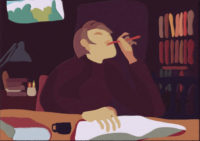You have no items in your cart. Want to get some nice things?
Go shoppingTime passes slowly in front of my computer screen. I have a short story in mind, but I can’t face writing it. I have e-mails still unanswered, friends asking how work’s going, if I read this, watched that, I can’t bring myself to reply. It’s not that I don’t value the relationship, but I can’t engage with them today. I can’t talk blog posts, writers’ pages, and literary jams. I can’t talk plots, or formula. Literature, its conceit, feels utterly farcical to me.
It’s been building for a while, there, at the back of my mind. Modern culture seems a soulless pretension, trading on past glories, and repetition. I hate what I write, I’ve lost faith in it. Lost the courage to see it through. I can’t talk to the writers I know, because their words, their presence in my life, has become overbearing. Their opinions smother me. I want to enjoy their success, to appreciate their work, but I feel this can only be done from far away.
I know this is nothing new, a writer seeing themselves in the wilderness. For years prominent artists have cultivated this image in order to elevate the status of their work. Painting self-portraits of unique alternatives to the authors of the day. Positioning themselves as cultural idealists, simultaneously the pure, visionary writer, and the acidic, venomous, critic. I’m not suggesting we all need to start attacking each other’s work in order to progress, but every time I see an article by some middle-aged, well established writer, suggesting writer’s only write for other writer’s, that writer’s no longer have anything interesting left to say, I can’t help asking if they only have themselves to blame. If they’ve allowed literature to be diluted, and infantilised, in order to succeed in a more streamlined, homogenised, landscape.
Over the last few years I’ve met many writers. Some are famous, at least in the context of their surroundings. Some are respected and revered. Others are just starting out, trying to get ahead. Quite often these meetings take place in one of two environments, the live reading, and the writing workshop. In either scenario I find I’m guilty of the exact literary dilution I so detest. I confuse modesty and humbleness with nonchalance and apathy. I dismiss my work, my desires, believing I lack ambition, and determination. This is perhaps largely due to the fact that I never feel as unsure of myself as I do when I am around writers, but I wonder how this sort of social awkwardness, combined with the expectations of fitting in, of playing the game, affects the work and opportunities of those with artistic aspirations.
As a society we tend to believe talent and talent alone brings success, but there is an element of naivety, and romanticism to this idea. I think it was Orson Welles, one of Hollywood’s most accomplished actors and directors, who said making movies was more about hustling than anything else. Granted literature is perhaps not quite the same, but there are aspects of trying to make it as a writer that have nothing to do with the quality of the writing itself.
Last year I read at the launch of Litro’s Hearing Voices Anthology. This should have been a proud moment for me. My story Seen And Not Seen had been selected to appear alongside a host of writers whose work I admired, writers I had written about. By the end of the evening however I came away thinking that on a personal level, the night was an absolute disaster. A nail in the coffin of a soon to be unrealised career.
It started with me mumbling like an idiot through a conversation with one of the other performers. For some reason I found it impossible to make eye contact, or answer any of her questions coherently. Then when it came to introducing my piece I forgot to thank Litro’s editor for the opportunity, and started rambling about my story being inspired by Tom Cruise in Vanilla Sky and a book I’d read on Howard Hughes. For days afterwards I felt utterly ashamed. I replayed the evening over and over in my head. The other writers seemed so confident, so self-assured to me. They had a presence I felt I lacked. They were professional, engaging. Thinking about it this now I still feel an intense embarrassment, and yet the emotions I felt in those days after the event was nothing compared to how I often felt after writing workshops.
For me these classes were marred by an oppressive competitiveness, which clashed with the uniformed display of comradery, and community. There is nothing wrong with this sort of one-upmanship rivalry in theory. Think of the Modernists. Think of Tolstoy, Dostoyevsky, and others in Russian literatures Golden Age. These writers challenged each other to greatness. They provided one another with the incentive to produce ever better pieces of work. I’ve seen this happen in the classroom, small groups, driving each other on. I’ve seen evidence of the opposite to though. Good writers stripped of individuality, their judgement clouded by academia. Their work becoming blandly polished, intellectually submissive. All their fire, all their guts, gone.
Of course I’m not dismissing readings, and workshops, or any of the ways writers choose to broaden their horizons. What I’m asking, what I’m trying to figure out, is whether this kind of literary collectivism is now the only way to thrive. If immersing yourself in local scenes, in criticism, performance, and study, is the best way for all fledgling writers to flourish, to find and maintain their voices.
A few years ago I wrote a small article about German painter Caspar David Friedrich, perhaps the most influential of all of Germany’s Romantic painters. When he died Friedrich was penniless, his work mired in obscurity. Often criticised and misunderstood for an artistic stance that went against the trends and fashions of his age, of enlightenment, he once said,
I am not so weak as to submit to the demands of the age when they go against my convictions. I spin a cocoon around myself; let others do the same. I shall leave it to time to show what will come of it; a brilliant butterfly or maggot.
For modern writers this kind of idea is becoming increasingly difficult. A balancing act is required between trying to get your work noticed, and not losing yourself among those chasing the same dreams, using the same tools, responding to that same creative spark. For writers to remain relevant, to avoid an era of identikits, I believe we have to face up to the world as it is, not how we want it to be. Remaining true to our voices, our idiosyncratic views on the state of things, we must not lose sight of what we strive to create. Because anything else is surely just an echo in the room, another face in the crowd.

About Reece Choules
Reece Choules is a regular contributor to both Litro and The Culture Trip. He lives and works in South London.




